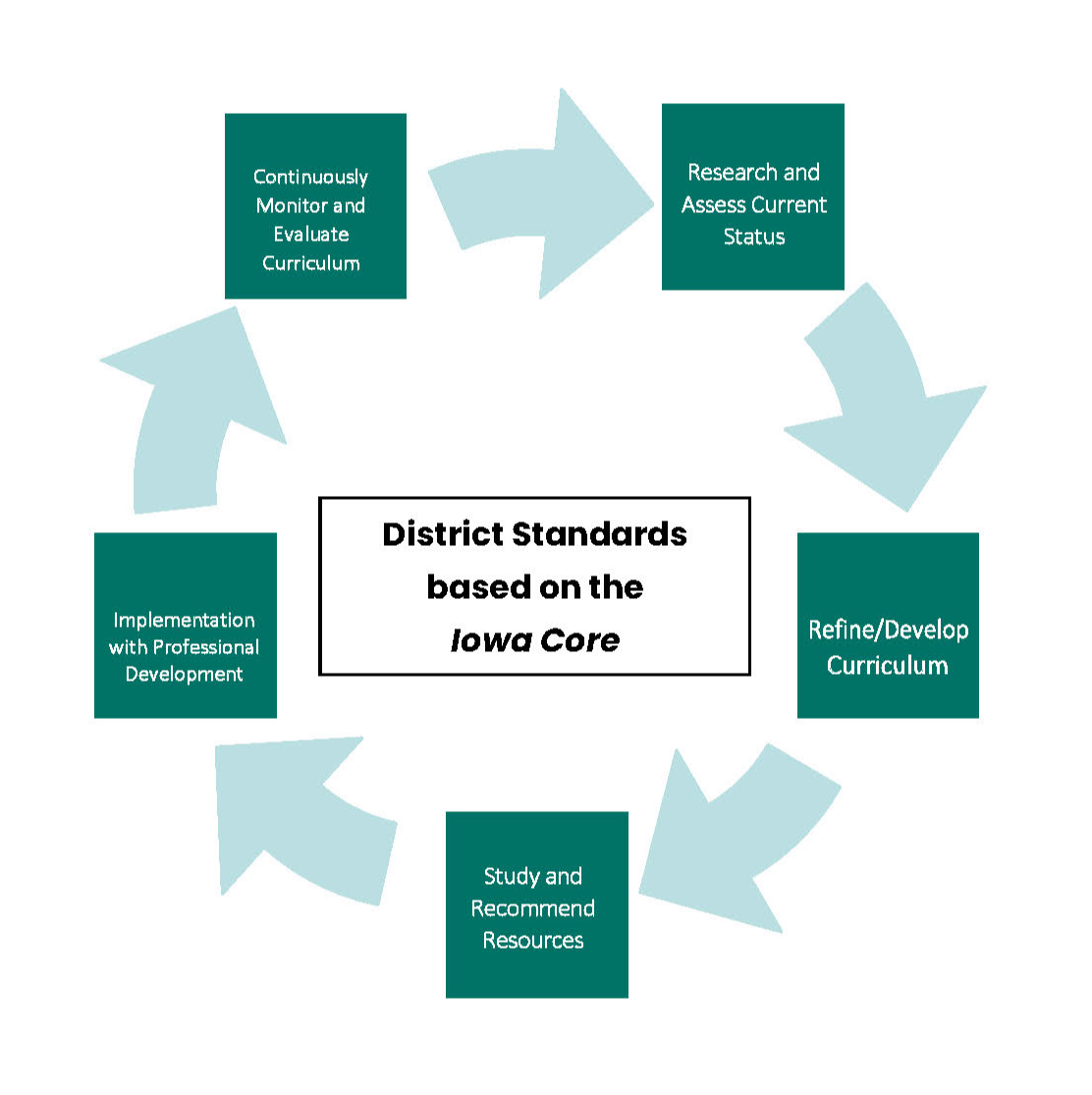
Code Number: 602.8
Curriculum development is an ongoing process which embraces research, design and assessment. Research is the inquiry and critical investigation of the various content areas for the purpose of revising and improving curriculum and instruction based on relevant information pertaining to the discipline. The study is conducted both internally to determine what and how we are currently doing at the local level effectively and externally to examine national standards and current research. Design is the deliberate process of planning and selecting the standards, based on the Iowa Core, as well as the instructional strategies that will improve the learning experiences for all students. Assessment involves the process in which instruction and learning is continuously appraised.
A systematic approach to curriculum development (research, design and articulation of the curriculum) serves several purposes:
Focuses attention on the content standards of each discipline.
Identifies student expectations that are rigorous, challenging, and represent the most important Assess student achievement of exit level performance and program standards at certain benchmarks in time.
Learning for our students.
Increases the probability that students will acquire the desired knowledge, skills and dispositions and that our schools will be successful in providing appropriate learning experiences.
Facilitates communication and coordination.
Improves classroom instruction through the adoption of high-quality curricular resources.
In making recommendations to the Board, the Superintendent or his/her designee shall propose curricula that will meet the following criteria:
Fulfill the mission statement of the District.
Promote the understanding of cultural differences and similarities, tolerance, and a globally interdependent view of the world.
Effectively meet and exceed the Iowa Core standards.
Reflect the educational and operational needs of the District.
Be driven by exit level performance and program standards.
Identify minimum program standards for each course/grade level.
Articulate course of study for Preschool through Grade 12.
Assess student achievement of program/course level standards using formative and summative methods.
Provide remediation and enrichment programs based on student achievement of standards at specific benchmarks in time.
The Standards and Benchmarks (newly developed or a major revision) must be approved by the Board before being implemented.
Stage One: Research and assess current status
Develop curriculum committee.
Analyze District data and investigate its use by buildings.
Collect and analyze perception data from parents and students.
Review state and national data.
Summarize and transmit current research on best practice.
Conduct needs assessment.
Analyze data from needs assessment.
Stage Two: Refine/develop curriculum
Review beliefs, mission, vision and philosophy.
Critique current standards and benchmarks as an essential skills framework based on Iowa Core, as a minimum.
Make revisions, as necessary (based on current research).
Communicate revisions to stakeholders.
Identify appropriate instructional strategies.
Stage Three: Study and recommend resources
Develop ad hoc curriculum/textbook committee.
Review current textbooks/resources.
Designate specifications for textbook/resources.
At a minimum, the committees should consider the following areas when selecting textbooks and resources for curriculum delivery.
Accuracy, rigor, focus on multi-cultural approach, ability to differentiate for individual learners, instruction in the area of critical thinking, focus on respect for others, professional development, and a review of the publisher’s service and professionalism.
Determine methods for investigation of different resources.
Presentations given by company reps, if appropriate.
Select resources through committee consensus.
Give purchase recommendations to Board of Education.
Formulate budget proposals for curriculum writing and professional development.
Write/refine ancillary guides: curriculum maps, assessments.
Plan future professional development.
Communicate to stakeholders.
Stage Four: Implementation
Distribution of textbooks/resources.
Provide professional development on implementation of resources with instructional strategies.
Survey teachers at the year’s end for determination of additional PD needs.
Assess student progress through District developed formative and summative assessments.
Stages Five-Seven: Monitor and evaluate curriculum
Analyze teacher surveys.
Continue professional development based on data and surveys.
Analyze student data based on Iowa Assessment performance levels:
Advanced level
Proficient level
Not proficient level
Based on a national standard score
